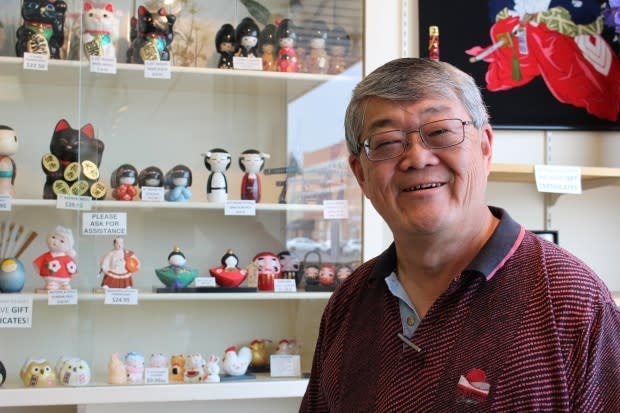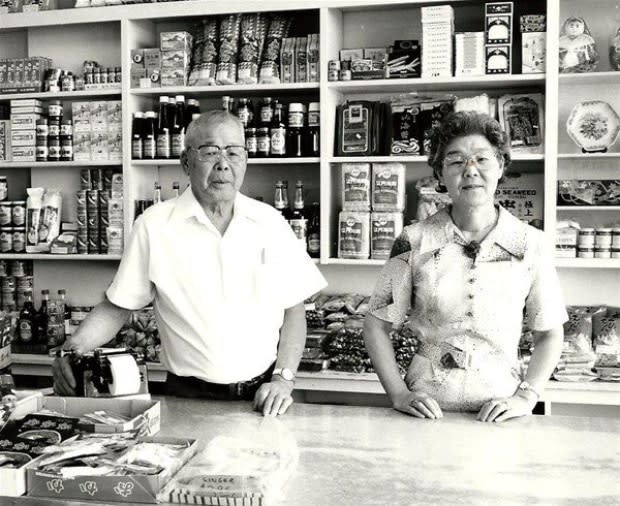Lethbridge store a staple for Japanese families in turbulent times
There is a store in Lethbridge, Alta., at 322 Second Avenue that many years ago provided refuge for people at a time when they needed it most.
Nakagama's Japanese Foods and Giftware has been a staple in the city for more than 70 years — a symbol of multiculturalism but also a reminder of a dark period in Canadian history.
Ken Nakagama is the current owner.
His father, Ryutaro Nakagama, built the business from the ground up during a time when Japanese Canadians were facing persecution.
The bombing of Pearl Harbor gave way to an irrational fear of Japanese Americans, which soon spread north.
In the 1940s, Japanese Canadians were forced away from their homes on the West Coast, and sent east, beyond the Rocky Mountains.
Some were sent to internment camps, others to work on farms in southern Alberta. Many were forced to sleep in outbuildings, like chicken coops and storage sheds.
Ryutaro Nakagama was one of them.

But his store has roots that predate his forced move to Alberta.
"My father opened a store in Steveston, B.C., which is in the southwest corner of Richmond. At that time Steveston was a fishing village comprised almost entirely of Japanese people," Ken Nakagama told The Homestretch. When Nakagama's father was forced to farm in Alberta, he found a way to get back into the business he knew. "I think he disliked farming more than fishing. So he wanted to get back into the retail trade. He had some money and he was able to put enough together to get a truck," Nakagama said. "A lot of the Japanese families were isolated on the farms and they did not have vehicles and so it was not easy for them to move about.
"So, with his truck he was able to start getting product. Once he had that he was able to slowly, slowly build up an inventory and go farm to farm."
'It was not easy'
Nakagama's father had ambitions to have a brick and mortar storefront in what he saw as the most logical and central place — Lethbridge.
But at that time, Japanese Canadians were not permitted inside the city, unless they worked in homes of sponsors or were given special permission by the RCMP.
"I think it was over a year before he got his business licence. He went to city hall, tried to get a license but everyone, they would always say to him, 'Well, we'll see. Come back. We'll see.' So it was not easy and the laws were starting to ease up," Nakagama said.
Eventually, his dad was granted a licence and opened a store on First Avenue in Lethbridge in 1947. It was part restaurant, part rooming house.
In the early days, the inventory on the shelves was sparse.
The store in some ways is a public institution, a community centre. - Darren Aoki
The rooming house above the store was used mostly by Japanese people who come to the city for work or school.
"A lot of our customers, particularly the ones with the Japanese roots, many of them are our friends. They're not just customers."
The store eventually moved to their current location at 322 Second Avenue South.
The family lived behind the store and Nakagama says it was a part of their lives from the very beginning.
Nakagama's nephew, Darren Aoki, also grew up with a strong connection to the store from visits.

"The front half of the store was their business and the back half was their residence. Whenever I came to visit my cousins for Christmas, we were always in the back half of the store. We could run to the front and my grandmother always had Orange Crush in the little coolers," Aoki said.
"It was part of the family fabric. The store in some ways is a public institution, a community centre."
Aoki is now a world history lecturer at the University of Plymouth in the United Kingdom.
But a few times a year he heads home to Lethbridge to lead the Nikkei Memory Capture Project, a joint study with the University of Lethbridge.
It collects the oral histories of Japanese diaspora in and around the southern Alberta city.
"It's quite powerful," he said.
"They're people I would have known about through my parents, not necessarily my generation, but then I come back to it now and I've got a relationship with them. They've shared things with me and it's moving. It really is."
The Nikkei Memory Capture project continues to expand and has received funding that will help further the project into 2023.


